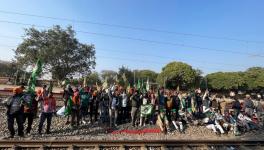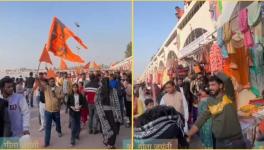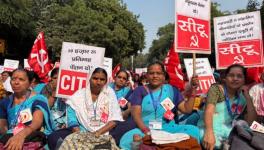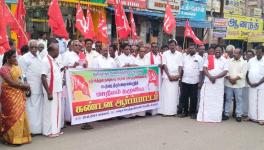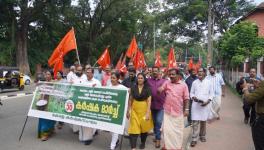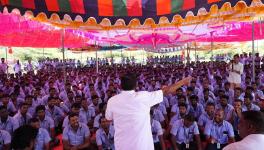Still Determined to Fight, Farmers Continue Padayatra Despite Blisters on Feet
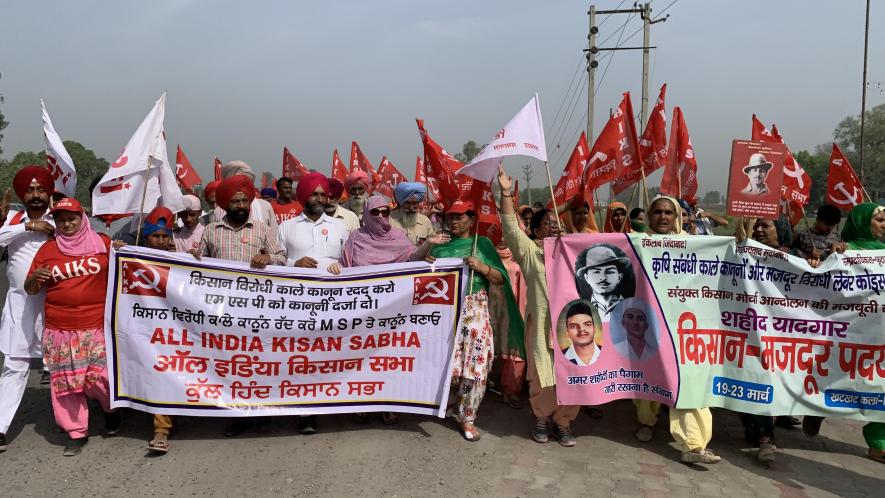
How should farmers best express their pain? After having walked for miles, their feet have developed blisters. Still, their biggest gripe is that the government they elected is unwilling to listen to them. However, they are determined that they will make the “deaf hear”, as legendary freedom fighter and revolutionary Bhagat Singh had, ahead of Martyrdom Day – March 23.
These farmers, labourers and agricultural workers began their journey from Khatkar Kalan – ancestral village of Bhagat Singh – in Punjab’s Nawanshahar to the Singhu Border to campaign against the Farm Laws and the four Labour Codes. Their yatra also revealed much about how they are organising themselves.
Flagging off the caravan, K. Hemalata, president, Centre for Indian Trade Unions (CITU) said that the farmers and workers are fighting a joint struggle to save their livelihood. “The government introduced four labour codes similar to the farm laws at a time when the entire country was struggling with the COVID-19 pandemic. The prime objective of the codes is to serve corporate interests. It came at a time when people were expecting some relief from the government due to joblessness. The Essential Commodities (Amendment) Act will completely dismantle the Public Distribution System which has already been compromised. Millions of workers depend on the ration provided under PDS.”
Sukhwinder Singh Sekhon, vice-president, All India Kisan Sabha (AIKS) Punjab, said that the farmers would travel to Panipat in vehicles where jathas from different districts would merge and begin their march on foot.
Travelling in truck half-full one notices the fans in a corner, suggestive of the fact that farmers are gearing up for the scorching. While speaking to his friends, Vikram Singh Gill said that even the British colonisers did not introduce such “atrocious laws”. However, their primary concern was the upcoming crop of wheat which would be ready in the next twenty days. When asked if they would show land records mandated by the Food Corporation of India for procurement, someone sitting next to Gill said: “It is a death sentence for people like us who are sharecroppers and take land on rent. As per the order, the money for the crop would go to the land owner’s account. We cannot accept that.”
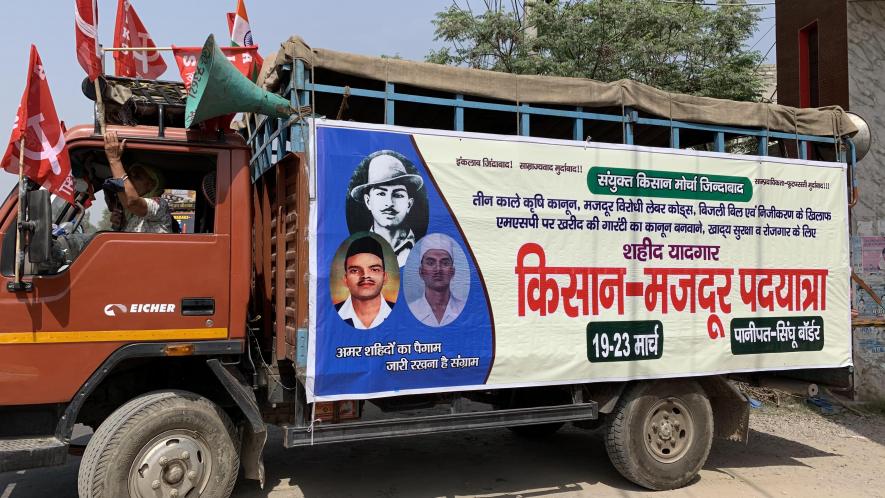
After a brief halt at Shambhu Border, the farmers moved to their next stop, Panipat. Gill tried to satisfy some curiosities. “I have been asked on multiple occasions by both, supporters, as well as critics of the movement, about its future. I just want to say that the time after the movement will be different. No government would dare touch farmers. What is all this ego about? Their ministers themselves accepted that the laws were replete with errors. Why are they hesitant to repeal them?” he asked.
Panipat reveals much about the organisation behind the movement and the BJP’s politics to dent the movement. The farmers are staying in a mammoth building named Kisan Bhawan, built exclusively for organising activities. An average Joe would completely ignore and confuse it with any other building in the city. The management of the building is under Bharatiya Kisan Union (Tikait). Sunil Bulana, who heads management and is president of the union’s Panipat unitm said the idea behind the building was to provide a place to stay to farmers visiting the city. The union conducts its monthly meeting here where a statement of revenue and expenses is put before its members, further course of action to be taken on local issues are discussed as is coordination. “We were approached by the AIKS for the programme. We readily accepted it. Our members too will join the yatra.”
The farmers movement has changed many social equations. Before reaching Panipat Newsclick met a farmer who said the community made a mistake by voting for the BJP. However, there is still disdain for affirmative action like reservation. “My son scored much higher than candidates from reserved categories. Still he did not get a job.” Within the next few kilometres another farmer associated with the CITU-affiliated Sarv Karamchari Sangh said: “Who is the BJP promising reservation to when all public sector undertakings will be privatised?”
Jai Bhagwan, general secretary, CITU Haryana, alleged that one of their meetings had to be cancelled because local BJP leaders put pressure on someone attending to the meeting’s affairs. Still, the march got a rapturous welcome wherever it went. The batch of 150 farmers was first welcomed in Ratangarh near Chaduni Jatta in Kurukshetra, famous for its association with Gurnam Singh Chaduni, where the local villagers had arranged lunch for the farmers. Similar receptions followed in the villages of Patti Kaliyana (Samalkha) and Ganaur where the hosts showered flower petals and greeted them with sweets and water. Notably, the women constituted an important part of small assemblies organised on the sidelines of the receptions. A leading Gurudwara in Samalkha arranged for accommodation and dinner and the residents of the city came by to inquire about their well-being.
Mohd Sultan, who hails from Ganaur, said that they did not know about the march. Yet, they arranged water and fruits as soon as they heard about it. “We did not know that farmers from Punjab were marching on foot. When we heard about it my neighbours and I quickly arranged water and other necessities. This dispensation believes in dividing people whereas the movement is bringing us closer together.” Ganaur was where this reporter left the group, which had swelled to about 350 farmers. More farmers were expected to join the group as the organisers planned to hold meetings in Kamaspura, Dipal Pur and Rai in Sonipat district.
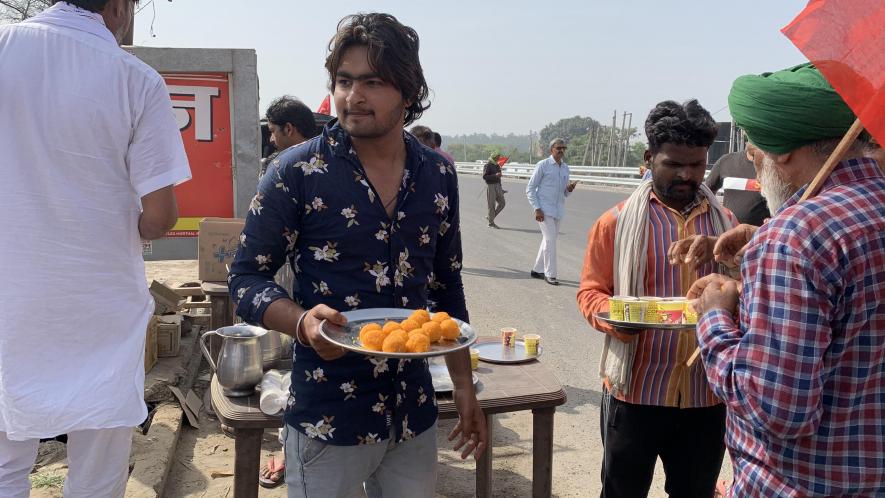
However, the most notable thing about the participants was them overcoming physical and mental obstacles to be part of the march. Neelam Rani Badhoan, a NREGA worker, showed a bandage over the blisters on her feet, worn out by walking under the sun. She still chose to walk. “Now I do not get a full quota of work under NREGA. As a result I have to work in farms as an agricultural worker. How will I earn if the farms are given to companies?” she asked.
Pyara Singh Lasada, in his seventies, has been marching alongside his grandson, despite having just helped his wife get cured of a brain tumour a few days ago. “When the Samyukta Kisan Morcha gave the call to reach Jantar Mantar on November 26 last year my family and I were there. The police had detained us in a stadium before releasing us. Then we shifted to Singhu Border. After spending a month there my wife complained of a headache. After examination the doctors told us that she had a tumour in her brain that would affect her speech progressively. She was cured of it but lost her speech... Why am I marching? It is because humanity is bigger than family. But yes, I am fighting for my children and their future.”
Get the latest reports & analysis with people's perspective on Protests, movements & deep analytical videos, discussions of the current affairs in your Telegram app. Subscribe to NewsClick's Telegram channel & get Real-Time updates on stories, as they get published on our website.









